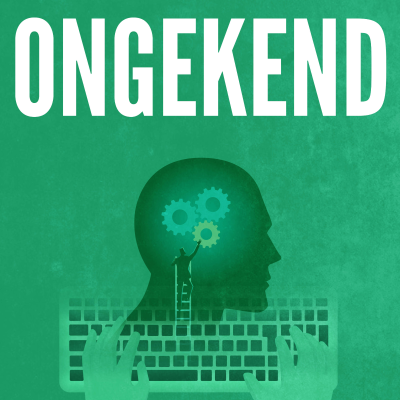
Ongekend
Podcast von Maarten van Doorn
Nimm diesen Podcast mit

Mehr als 1 Million Hörer*innen
Du wirst Podimo lieben und damit bist du nicht allein
Mit 4,7 Sternen im App Store bewertet
Alle Folgen
27 FolgenToday, I have the honor of speaking with Hugo Mercier. He's one my favorite cognitive scientists, workin at the French National Center for Scientific Research. Most of his work so far has focused on the function and workings of reasoning. According to the argumentative theory of reasoning, which he lays out in his book The Enigma of Reason, the function of reasoning is argumentative: to find and evaluate arguments so as to convince others and only be convinced when it is appropriate. This, in fact, works quite well: Hugo has found a lot of evidence that people are good at producing and evaluating arguments, and change their minds accordingly. So, in effect, one of Hugo's messages is: arguments work! We talk about this in detail. We also discuss his other book, Not Born Yesterday, which argues against the idea that people are guillible. In fact, says Hugo, it's quite hard to persuade people, and you need good arguments to do it. Our conversation starts with me asking Hugo what, in his first book, he means with the "enigma" of reason. What is the enigma, or the riddle, the puzzle, of reason? What's the mystery here? Enjoy our conversation! Here's what we talk about: * How can reason work so well in some contexts and so terribly in others? * The individualistic versus the collectivistic view of reasoning * What the function of reason is * Cool evidence that people recognize strong arguments against their opinions and then change their mind accordingly * When discussion leads to the truth, and when it leads to polarization * Why people are not guillible (Not Born Yesterday) Find us: * Hugo Mercier: website [https://sites.google.com/site/hugomercier/?pli=1], twitter [https://twitter.com/hugoreasoning] * Maarten van Doorn: website [https://maartenvandoorn.com/], twitter [https://twitter.com/maartenvdoorn] Mentioned books: * Hugo Mercier & Dan Sperber (2018): The Enigma of Reason: A New Theory of Human Understanding [https://partner.bol.com/click/click?p=2&t=url&s=51094&f=TXL&url=https%3A%2F%2Fwww.bol.com%2Fnl%2Fnl%2Ff%2Fthe-enigma-of-reason%2F9200000066200065%2F&name=The%20Enigma%20of%20Reason] * Hugo Mercier (2022): Not Born Yesterday: The Science of Who We Trust and What We Believe [https://partner.bol.com/click/click?p=2&t=url&s=51094&f=TXL&url=https%3A%2F%2Fwww.bol.com%2Fnl%2Fnl%2Ff%2Fnot-born-yesterday%2F9200000110219107%2F&name=Not%20Born%20Yesterday]
Aflevering 26 van de Ongekend podcast alweer! Wij mensen hebben de indruk dat we zelf keuzes maken, maar de wetenschap vertelt volgens sommigen een heel ander verhaal: onze handelingen zijn slechts het resultaat van onze persoonlijke eigenschappen, onbewuste associaties en hersenprocessen. Benjamin Libets baanbrekende experimenten suggereren bijvoorbeeld dat we niet uit vrije wil ons lichaam bewegen, omdat onze hersenen al besloten hebben wat we gaan doen voordat we ons daar bewust van zijn. Wat als dat allemaal anders zit? Dat bespreek ik met psychologe en filosofie Lieke Asma (Munich School of Philosophy) We praten over de filosofie van de vrije wil * Wat betekent het eigenlijk om vrije wil te hebben? * Causale verklaringen van gedrag zijn niet compleet. Als je zo naar gedrag kijkt, snap je iets niet * En zelfs als ik jou gedrag met hersenprocessen kan verklaren en ook voorspellen, waarom zou dat dat betekenen dat je niet zelf de keuze hebt gemaakt? * Waarom vaardigheden en omstandigheden cruciaal zijn voor vrije wil * Wat menselijke handelingen bijzonder maakt en op welk niveau je ze het beste begrijpt Meer weten * Lieke Asma: website [http://liekeasma.org/], twitter [https://twitter.com/AsmaLieke] * Maarten van Doorn: website [https://maartenvandoorn.com/], twitter [https://twitter.com/maartenvdoorn] * Lieke Asma (2021) - Mijn intenties en ik. Filosofie van de vrije wil [https://partner.bol.com/click/click?p=2&t=url&s=51094&f=TXL&url=https%3A%2F%2Fwww.bol.com%2Fnl%2Fnl%2Ff%2Fmijn-intenties-en-ik%2F9300000041346840%2F&name=Mijn%20intenties%20en%20ik%2C%20Lieke%20Asma]
Partisan disagreement over policy-relevant empirical facts is a salient feature of contemporary politics. A common inference in behavioral science is that people’s motivation to reach a conclusion that confirms their political group identity causally affects their reasoning. So there's all this disagreement because people are just following the tenets of their tribe. But according to cognitive scientist Ben Tappin (MIT), it's not that simple. Here's what we talk about: * What explains disagreements on empirically solvable disputes like the reality of climate change? Why don't people just converge on the facts? * "Cultural cognition" or "Identity-protective cognition": How social incentives influence beliefs * Experimental evidence for cultural cognition * Maybe these results are not due to political group identities contaminating people's reasoning. But just due to plain old boring prior beliefs Find us: * Ben Tappin: website [https://www.benmtappin.com/], twitter [https://twitter.com/ben_tappin] * Maarten van Doorn: website [https://maartenvandoorn.com/], twitter [https://twitter.com/maartenvdoorn], RU page [https://www.ru.nl/personen/doorn-m-j-van/] Mentioned papers: * Koehler, J. (1993): The Influence of Prior Beliefs on Scientific Judgments of Evidence Quality [https://www.sciencedirect.com/science/article/abs/pii/S0749597883710447] * Tappin, B., & Gadsby, S. (2019). Biased belief in the Bayesian brain: A deeper look at the evidence [https://www.sciencedirect.com/science/article/abs/pii/S1053810018305075]. * Tappin, B. M. (2021). Exposure to Persuasive Messaging Changes Partisan Attitudes Even in the Face of Countervailing Leader Cues. [https://doi.org/10.31234/osf.io/247bs] * Tappin, B. M., Pennycook, G., & Rand, D. G. (2020). Thinking clearly about causal inferences of politically motivated reasoning: Why paradigmatic study designs often undermine causal inference [https://doi.org/10.1016/j.cobeha.2020.01.003]. * Tappin, B. M., Pennycook, G., & Rand, D. G. (2021). Rethinking the link between cognitive sophistication and politically motivated reasoning [https://doi.org/10.31234/osf.io/yuzfj]. * Kunda, Z. (1987). Motivated inference: Self-serving generation and evaluation of causal theories [https://psycnet.apa.org/doiLanding?doi=10.1037%2F0022-3514.53.4.636].
There’s a huge debate going on in social science right now. The question is simple, and strikes near the heart of all research: What counts as solid evidence? When it comes to proving an hypothesis, key terms are 'statistical significance' and 'p-values'. With philosopher of science Remco Heesen (University of Western Australia & University of Groningen) I discuss the ongoing discussion around these concepts, and clear up some misunderstandings along the way. Here's what we talk about: * How do scientists determine whether an experimental result should be considered true, i.e. wheher the experiment worked / whether some manipulation was effective / wheter there was an effect or difference between groups * P-values and “statistical significance” play a central role here but are widely misunderstood. This is what they actually mean. * Problems with this way of doing science * What could be alternatives? (Briefly) More info * Remco Heesen: website [https://remcoheesen.eu/], twitter [https://twitter.com/remcoheesen], UWA pagina [https://www.uwa.edu.au/profile/remco-heesen], RUG pagina [https://www.rug.nl/staff/remco.heesen/research] * Maarten van Doorn: website [https://maartenvandoorn.com/], substack [https://maartenvandoorn.substack.com/], twitter [https://twitter.com/maartenvdoorn], RU pagina [https://www.ru.nl/personen/doorn-m-j-van/]
In theorie is bijna iedereen er wel voor, voor iedereen geven wat-ie verdient, waar hij of zij recht op heeft. Voor een meritocratie, dus: een maatschappij waarin niet je afkomst, maar je verdienste (je talent en inzet) je maatschappelijke positie zou bepaalt. Toch is er de laatste jaren veel geschreven over de nadelen ervan. Als iedereen in naam alles kan worden, alles kan leren dan is voor je het weet succes een keuze en pech je eigen schuld, bijvoorbeeld. En is het eigenlijk wel haalbaar om zaken te verdelen op basis van dat vage verdienste, is dat niet een te abstract en contentieus concept om op te sturen? Ondanks die twijfels, zijn er nog weinigen die het meritocratische ideaal verwerpen. Maar misschien is het idee van verdienste dusdanig ongeschikt als verdeler, dat we dat wel zouden moeten doen. Daar heb ik het deze aflevering over met Dick Timmer (politiek filosoof aan de Technische Universiteit Dortmund) en Myrthe Martinot (econome bij de Rabobank). We praten over: * Wat is een meritocratie eigenlijk? (Moeilijkere vraag dan het lijkt.) * Waarom inkomensverschillen niet corresponderen met moreel relevante potentiele rechtvaardigers ervan (hard werken, talent, etc.) * Zou dat wel moeten, een systeem waarin je individuele inkomensverschillen organiseert en rechtvaardigt op basis van verdienste? * Intuïtief zou je, denk ik, denken van wel, maar Dick denkt van niet en stelt een ander systeem voor Meer weten * Dick Timmer: website [https://www.dicktimmer.com/], twitter [https://twitter.com/_dicktimmer] * Myrthe Martinot: LinkedIN [https://www.linkedin.com/in/myrthe-martinot-b59756a0/] * Maarten van Doorn: website [https://maartenvandoorn.com/], twitter [https://twitter.com/maartenvdoorn] * Michael Sandel - De tirannie van verdienste [https://partner.bol.com/click/click?p=2&t=url&s=51094&f=TXL&url=https%3A%2F%2Fwww.bol.com%2Fnl%2Fnl%2Ff%2Fde-tirannie-van-verdienste%2F9200000133060641%2F&name=De%20tirannie%20van%20verdienste%2C%20Michael%20J.%20Sandel] * Joseph Heath - On the Very Idea of a Just Wage [https://www.ejpe.org/journal/article/view/326]























